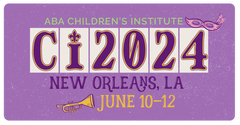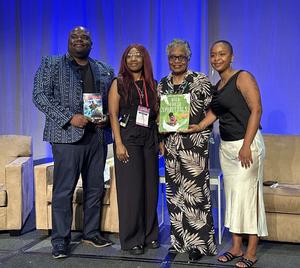 The final day of Children's Institute 2024 began Wednesday morning in New Orleans, La., with a keynote breakfast spotlighting Black publishing.
The final day of Children's Institute 2024 began Wednesday morning in New Orleans, La., with a keynote breakfast spotlighting Black publishing.
Kwame Mbalia, author and publisher of Freedom Fire Books, Bria Ragin, editor at Joy Revolution, and Cheryl Willis Hudson, author and publisher of Just Us Books, convened to share their experiences, insights, and hopes for the industry. Britt J. Camacho, the American Booksellers Association's DEIA and communications senior copy editor, moderated the discussion.
Hudson and her husband founded their publishing company in 1988, at a time when there were "only a few" Black authors and illustrators being published by the major houses. Just Us Books rose from their desire as parents to find "good books for our children," and after self-publishing a book of their own, they decided to do it full-time. The name, which people often note can be read as "Justice Books," was inspired by the fact that it really was "just the two of us," Hudson recalled. Their aim has been to publish authentic stories that feature "regular children doing regular things" and share the joys and the wonders of being a kid.
 |
|
| Left to right: Kwame Mbalia, Bria Ragin, Cheryl Willis Hudson, and Britt J. Camacho | |
Mbalia, who writes the Tristan Strong series of middle-grade books, said that his journey to being a publisher "all comes back" to being a "young reader who just wanted more, more, more stories." After years of championing and highlighting Black books through book clubs and newsletters, his editor eventually approached him and asked if he wanted to work together on starting an imprint designed to uplift Black stories. The imprint's name, he remarks, is meant to evoke the freedom to read and the feeling a child gets when they pick up a book and feel like it was written just for them. "We want to spark a change. We want to ignite again that love for reading."
Ragin shared that her desire to publish Black authors and stories began in high school. She was an avid YA reader but didn't see herself in those books, and from early on wanted to "get into publishing and do YA romance." She studied creative writing in college, worked as a bookseller at a chain bookstore, interned at a literary agency, and worked at HarperCollins for about four years. In October 2020, when she saw the announcement for the Joy Revolution imprint, which publishes "swoony" teen romance novels featuring characters of color, she thought, "was this made for me?"
Camacho noted that in her DEIA work, she sometimes encounters people who question the need of bringing up identity at all, who suggest that it is better to simply call oneself a publisher rather than a Black publisher; she asked the panelists what it means to them to put their identity out there.
Hudson responded that it "really is important to put that out there." She wants people to know that Just Us is a publisher that is authentic and is part of the community that it represents. She also pointed out that those sorts of questions inadvertently highlight the assumptions and biases of the people asking them. As an example, she mentioned that a story featuring a white child can be considered universal and relatable to anyone, but replace that child with a Black or Asian child and suddenly the same story is not universal. It becomes identified as a Black book, or an Asian book, or whatever the character's identity may be, even though it is still "universal and talks about the human experience."
Mbalia brought up an analogy that was inspired by his four-year-old son and which he returns to often: "When you go to a birthday party that is not for you, you still have fun." You'll get some cake, play some games, possibly walk away with a goodie bag, and "you're going to have fun. But the day is not for or about you." Nevertheless, everyone is having a great time. "So when we say we're publishing books about uplifting and celebrating Black culture and Black stories, that doesn't mean that you can't read them and enjoy them."
Ragin mentioned the concept of equity in publishing and explained that it is "not saying that I'm the same as my white counterparts, my white editors and colleagues, it's giving me the extra resources and support so that I can be as successful as them knowing that I'm fighting many battles." She also discussed how people sometimes talk about reading diverse books like it's a reminder to eat one's vegetables. "These are commercial stories that anybody would love," she said. "This is not homework. I want this to be like you are reading this book just as you would a Sarah Dessen book. That's what I want to get to."
The keynote talk concluded with the panelists sharing ways independent booksellers can help support Black publishers and authors. Mbalia suggested they reach out to publishers about schools in their area that are "hungry" for author visits, especially in the middle-grade space. Hudson said that so many valuable connections have come from booksellers and librarians, and she encouraged indies to "buy our books, invite us to your stores" and keep doing what they're doing to forge connections with their communities.
As a former bookseller, Ragin highlighted how vital and powerful handselling is, and encouraged indies to host as many events as they can and display diverse titles in prominent positions. "You guys are really, really vital to making all of our books a success." --Alex Mutter

